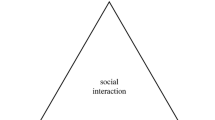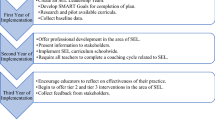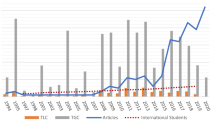Abstract
Many studies have explored educational and pedagogical affordances of social media, but few studies have investigated their impact on emotional and psychological aspects of language learning specifically Willingness to Communicate (WTC) in second and foreign language learners. In this paper, we have reviewed related research published in the last decade and inspected their results and the researchers’ points of view towards this issue. The main purpose of this study was to review the published papers to know about their data collection methods, contexts, participants, and predictors of WTC that were modified by social media. The findings showed that most of the studies utilized quantitative research design and were conducted in formal contexts in Asia. Social Media Assisted Language Learning (SMALL) users were often adolescent and young adult learners. Moreover, through analyzing data taking a content analysis approach, three themes related to predictors of WTC emerged: 1) SMALL and L2 learners’ self-confidence, 2) SMALL and L2 learners’ motivation, 3) SMALL and L2 learners’ anxiety. The themes were examined in-depth and some interesting and remarkable studies were narrated thoroughly. Scrutinizing the themes revealed that social media helped language learners to improve L2 WTC by increasing self-confidence and motivation and decreasing anxiety. Based on the results, we recommend that researchers examine other predictors of willingness to communicate that can be modified by the aid of SMALL (e.g., intergroup climate or motivation). Furthermore, instructors can employ social media as effective teaching tools to enhance learners’ communication competence and increase their participation in in-class activities.


Similar content being viewed by others
References
Al-Qaysi, N., Mohamad-Nordin, N., & Al-Emran, M. (2020). A systematic review of social media acceptance from the perspective of educational and information systems theories and models. Journal of Educational Computing Research, 57(8), 2085–2109. https://doi.org/10.1177/0735633118817879
Al-Rahmi, W. M., Alias, N., Othman, M. S., Marin, V. I., & Tur, G. (2018). A model of factors affecting learning performance through the use of social media in Malaysian higher education. Computers & Education, 121, 59–72. https://doi.org/10.1016/j.compedu.2018.02.010
Ary, D., Cheser Jacobs, L., Sorensen, C.K., & Walker, D.A. (2019). Introduction to research in education. Cengage.
Aydin, S. (2014). Foreign language learners’ interactions with their teachers on Facebook. System, 42, 155–163. https://doi.org/10.1016/j.system.2013.12.001
Barrot, J. S. (2021). Social media as a language learning environment: A systematic review of the literature (2008–2019). Computer Assisted Language Learning. https://doi.org/10.1080/09588221.2021.1883673
Bashori, M., van Hout, R., Strik, H., & Cucchiarini, C. (2020). Web-based language learning and speaking anxiety. Computer Assisted Language Learning, 1–32. https://doi.org/10.1080/09588221.2020.1770293
Basöz, T. (2016). Pre-service EFL teachers’ attitudes towards language learning through social media. Procedia - Social and Behavioral Sciences, 232, 430–438. j.sbspro.2016.10.059
Bielak, J., & Mystkowska-Wiertelak, A. (2020). Investigating language learners’ emotion regulation strategies with the help of the vignette methodology. System, 90, 102208. https://doi.org/10.1016/j.system.2020.102208
Brown, H.D., & Lee, H. (2015). Teaching by principles. Pearson Education.
Buckingham, L., & Alpaslan, R. S. (2017). Investigating language learners’ emotion-regulation strategies with the help of the vignette methodology. System, 65, 25–37. https://doi.org/10.1016/j.system.2016.12.016
Chik, A. (2019). Humorous interaction, language learning, and social media. World Englishes, 39(1), 1–14. https://doi.org/10.1111/weng.12443
Chotipaktanasook, N., & Reinders, H. (2016). Willingness to communicate in social media: An investigation of the long-term effects. Asian EFL Journal Research Articles, 18(4), 6–25.
Chugh, R., & Ruhi, U. (2017). Social media in higher education: A literature review of Facebook. Education and Information Technologies, 23, 605–616. https://doi.org/10.1007/s10639-017-9621-2
Clemént, R., Baker, S. C., & MacIntyre, P. D. (2003). Willingness to communicate in a second language: The effects of context, norms, and vitality. Journal of Language and Social Psychology, 22(2), 190–209. https://doi.org/10.1177/0261927X03252758
Creswell, J.W., & Creswell, J.D. (2018). Research design: qualitative, quantitative, and mixed methods approaches (5th ed.). Sage Publications.
Dashtestani, R. (2018). Collaborative academic projects on social network sites to socialize EAP students into academic communities of practice. Teaching English with Technology, 18(2), 3–20. Retrieved from http://www.tewtjournal.org
Deng, L., & Tavares, N. J. (2013). From Moodle to Facebook: Exploring students’ motivation and experiences in online communities. Computers & Education, 68, 167–176. https://doi.org/10.1016/j.compedu.2013.04.028
Fadilah, E. (2018). Perception, motivation, and communicative self-confidence of Indonesian students on willingness to communicate in L2 by using Facebook. JEELS, 5(1), 23–48.
Fornara, F., & Lomicka, L. (2019). Using visual social media in language learning to investigate the role of social presence. CALICO Journal, 36(3), 184–203. https://doi.org/10.1558/cj.37205
Jauregi, K., de Graaffa, R., van den Bergh, H., & Kriz, M. (2012). Native/non-native speaker interactions through video-web communication: A clue for enhancing motivation? Computer Assisted Language Learning, 25(1), 1–19. https://doi.org/10.1080/09588221.2011.582587
Kartal, G., & Balçikanli, C. (2018). Willingness to communicate and communication anxiety of EFL learners in a virtual world. Journal of Educational Technology, 15(3), 7–25. https://doi.org/10.26634/jet.15.3.14549
Kahar. R., Hanafi, H., & Alberth, A. (2016). The effect of Edmodo on students' willingness to communicate, intrinsic motivation and self-confidence of SMKN 4 Kendari. Journal of Language Education and Educational technology (JLEET), 1(2). https://doi.org/10.33772/jleet.v1i2.6702
Kessler, G. (2018). Technology and the future of language teaching. Foreign Language Annual, 51, 205–218. https://doi.org/10.1111/flan.12318
Lamb, M., & Arisandy, F. E. (2020). The impact of online use of English on motivation to learn. Computer Assisted Language Learning, 33(1–2), 85–108. https://doi.org/10.1080/09588221.2018.1545670
Le, T. V., Cunningham, U., & Watson, K. (2018). The relationship between willingness to communicate and social presence in an online English language course. JALT CALL Journal, 14(1), 43–59.
Lee, J. S. (2019). EFL students’ views of willingness to communicate in the extramural digital context. Computer Assisted Language Learning, 32(7), 692–712. https://doi.org/10.1080/09588221.2018.1535509
Lee, J. S., & Drajati, N. A. (2019). Willingness to communicate in digital and non-digital EFL contexts: Scale development and psychometric testing. Computer Assisted Language Learning, 33(7), 688–707. https://doi.org/10.1080/09588221.2019.1588330
Lee, J. S., & Dressman, M. (2017). When IDLE hands make an English workshop: Informal digital learning of English and language proficiency. TESOL Quarterly, 52(2), 435–445. https://doi.org/10.1002/tesq.422
Lee, J. S., & Hsieh, J. C. (2019). Education Affective variables and willingness to communicate of EFL learners in in-class, out-of-class, and digital contexts. System, 82, 63–73. https://doi.org/10.1016/j.system.2019.03.002
Lee, J. S., & Lee, K. (2019). Affective factors, virtual intercultural experiences, and L2 willingness to communicate in in-class, out-of-class, and digital settings. Language Teaching Research, 24(6), 813–833. https://doi.org/10.1177/1362168819831408
Lee, J.S., & Lu, Y. (2021). L2 motivational self system and willingness to communicate in the classroom and extramural digital context. Computer Assisted Language Learning, 1–23.https://doi.org/10.1080/09588221.2021.1901746
Lee, J. S., & Sylvén, L. K. (2021). The role of informal digital learning of English in Korean and Swedish EFL learners’ communication behaviour. British Journal of Educational Technology, 52(3), 1279–1296. https://doi.org/10.1111/bjet.13082
Lee, J.S., Xie, Q., & Lee. K. (2021). Informal digital learning of English and L2 willingness to communicate: roles of emotions, gender, and educational stage. Journal of Multilingual and Multicultural Development, 1–17. https://doi.org/10.1080/01434632.2021.1918699
Lin, C.-H., Warschauer, M., & Blake, R. (2016). Language learning through social networks: Perceptions and reality. Language Learning & Technology, 20(1), 124–147. https://dx.doi.org/10125/44449
MacIntyre, P. D. (2007). Willingness to communicate in the second language: Understanding the decision to speak as a volitional process. The Modern Language Journal, 91(4), 564–567. https://doi.org/10.1111/j.1540-4781.2007.00623.x
MacIntyre, P.D., Dörnyei, Z., Clément, R., & Noel, K.A. (1998). Conceptualizing willingness to communicate in a L2: A situational model of L2 confidence and affiliation. The Modern Language Journal, 82(4), 545–562. https://doi.org/10.1111/j.1540-4781.1988.tb05543.x
MacIntyre, P. D., & Legatt, J. J. (2010). A dynamic system approach to willingness to communicate: Developing an idiodynamic method to capture rapidly changing affect. Applied Linguistics, 32(2), 149–171. https://doi.org/10.1093/applin/amq037
Macaro, E. (2020). Systematic reviews in applied linguistics. In J. McKinley & H. Rose (Eds.), The Routledge handbook of research methods in applied linguistics (1st ed., pp. 230–239). Routledge.
Moghavvemi, S., Sulaiman, A., Ismawati Jaafar, N., & Kasem, N. (2018). Social media as a complementary learning tool for teaching and learning: The case of YouTube. The International Journal of Management Education, 16, 37–42. https://doi.org/10.1016/j.ijme.2017.12.001
Moher, D., Shamseer, L., Clarck, M., Ghersi, D., Liberati, A., Peticrew, M., … Stewart, L.A. (2015). Preferred reporting items for systematic review and meta-analysis protocols (PRISMA) 2015 statement. Systematic Review, 4(1), 1–9. https://doi.org/10.1186/2046-4053-4-1
Mohammadi, J., Barati, H., & Youhanaee, M. (2019). The effectiveness of using flipped classroom model on Iranian EFL learners' English achievements and their willingness to communicate. English Language Teaching, 12(5), 101–115. https://doi.org/10.5539/elt.v12n5p101
Oh, J.-E., Chan, Y. K., & Kim, K. V. (2020). Social media and E-Portfolios: Impacting design students’ motivation through project-based learning. IAFOR Journal of Education, 8(3), 41–58.
Otchie, W. O., & Pedaste, M. (2020). Using social media for learning in high schools: A systematic literature review. European Journal of Educational Research, 9(2), 889–903. https://doi.org/10.12973/eu-jer.9.2.889
Palfrey, J., & Gasser, U. (2011). Born digital: Understanding the first generation of digital natives. Basic Books.
Peng, J. E., & Woodrow, L. (2010). Willingness to communicate in English: A model in the Chinese EFL classroom context. Language Learning, 60(4), 834–876. https://doi.org/10.1111/j.1467-9922.2010.00576.x
Ratneswary, R., & Rasiah, V. (2014). Transformative higher education teaching and learning: Using social media in a team-based learning environment. Procedia - Social and Behavioral Sciences, 123, 369–379. https://doi.org/10.1016/j.sbspro.2014.01.1435
Reinders, H., & Wattana, S. (2015). Affect and willingness to communicate in digital game-based learning. ReCALL, 27(1), 38–57. https://doi.org/10.1017/S0958344014000226
Sharma, V. (2019). Saudi students’ perspective on social media usage to promote EFL learning. International Journal of Linguistics, Literature and Translation, 2(1), 129–139. https://doi.org/10.32996/ijllt.2019.2.1.17
Stewart, O. G. (2015). A critical review of the literature of social media’s affordances in the classroom. E-Learning and Digital Media, 12(5–6), 481–501. https://doi.org/10.1177/2042753016672895
Ulla, M. B., & Perales, W. F. (2020). The adoption of Facebook as a virtual class whiteboard: Promoting EFL students’ engagement in language tasks. TESOL Journal, 11(3), 1–4. https://doi.org/10.1002/tesj.515
Wu, W.-C.V., & Marek, M. W. (2019). Incorporating LINE smartphone affordances: Cross-cultural collaboration, willingness to communicate, and language learning. International Journal of Computer-Assisted Language Learning and Teaching (IJCALLT), 6(2), 56–73. https://doi.org/10.4018/IJCALLT.2016040104
Xue, S., & Churchill, D. (2019). Review of empirical studies of affordances and development of a framework for educational adoption of mobile social media. Educational Technology Research and Development, 67, 1231–1257. https://doi.org/10.1007/s11423-019-09679-y13A
Author information
Authors and Affiliations
Contributions
1. Esmat Shamsi: designing the study, collecting data, coding data, writing the drafts.
2. Hossein Bozorgian: coding data, editing, proofreading.
Corresponding author
Ethics declarations
Conflict of interest
The authors have no conflicts of interest to declare and no financial support they received for this study.
Additional information
Publisher's note
Springer Nature remains neutral with regard to jurisdictional claims in published maps and institutional affiliations.
Appendix
Appendix
Rights and permissions
About this article
Cite this article
Shamsi, E., Bozorgian, H. A review of empirical studies of social media on language learners’ willingness to communicate. Educ Inf Technol 27, 4473–4499 (2022). https://doi.org/10.1007/s10639-021-10792-w
Received:
Accepted:
Published:
Issue Date:
DOI: https://doi.org/10.1007/s10639-021-10792-w




